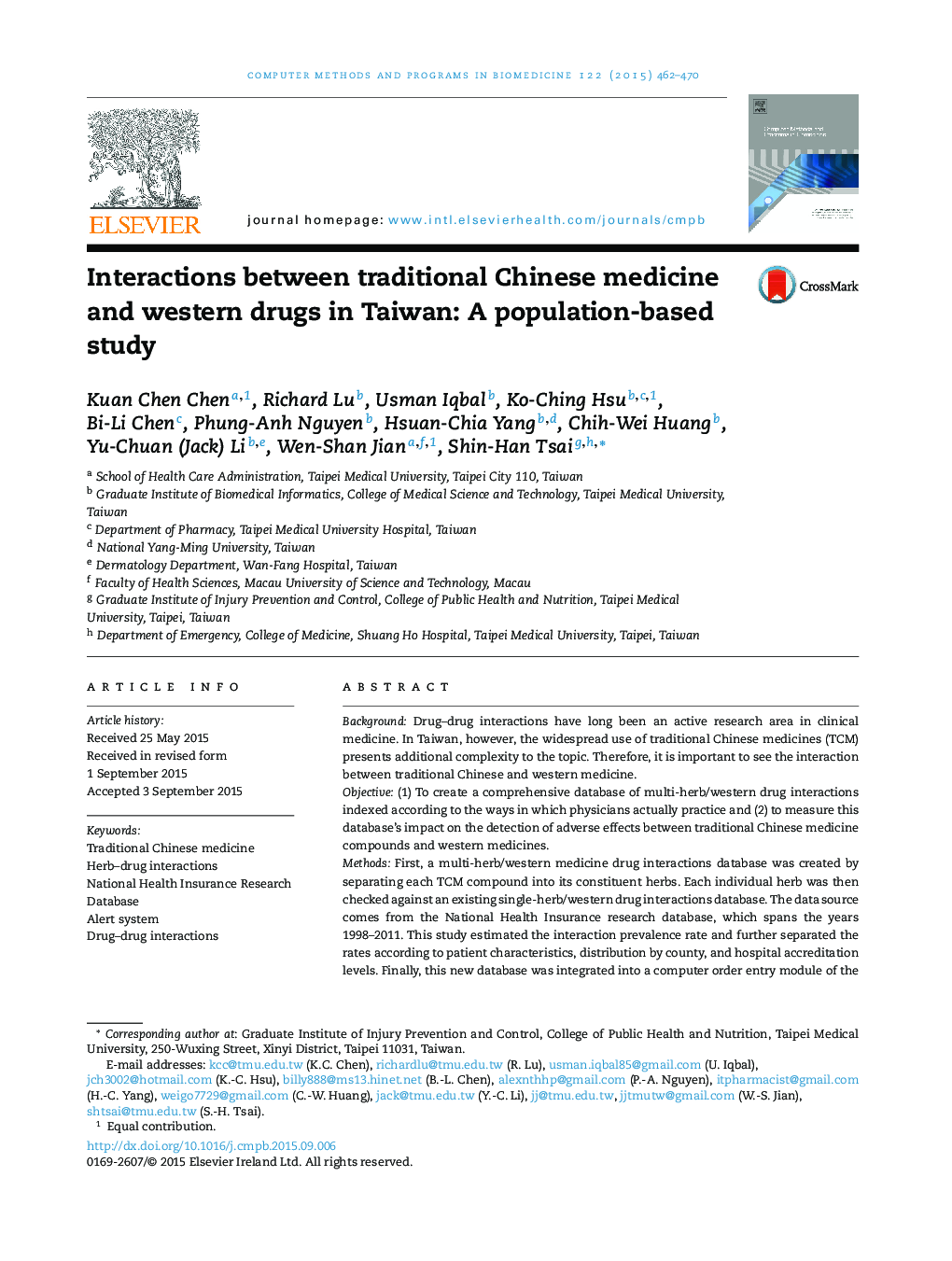| کد مقاله | کد نشریه | سال انتشار | مقاله انگلیسی | نسخه تمام متن |
|---|---|---|---|---|
| 468284 | 698209 | 2015 | 9 صفحه PDF | دانلود رایگان |
• Most commonly interacting Chinese herbs were Ephedrae Herba and Angelicae Sinensis Radix/Angelicae Dahuricae Radix.
• Unique cultural factors that have resulted in widespread acceptance of both western and traditional Chinese medicine.
• Taiwan stands well positioned to report on the prevalence of interactions between western drugs and traditional Chinese medicine.
BackgroundDrug–drug interactions have long been an active research area in clinical medicine. In Taiwan, however, the widespread use of traditional Chinese medicines (TCM) presents additional complexity to the topic. Therefore, it is important to see the interaction between traditional Chinese and western medicine.Objective(1) To create a comprehensive database of multi-herb/western drug interactions indexed according to the ways in which physicians actually practice and (2) to measure this database's impact on the detection of adverse effects between traditional Chinese medicine compounds and western medicines.MethodsFirst, a multi-herb/western medicine drug interactions database was created by separating each TCM compound into its constituent herbs. Each individual herb was then checked against an existing single-herb/western drug interactions database. The data source comes from the National Health Insurance research database, which spans the years 1998–2011. This study estimated the interaction prevalence rate and further separated the rates according to patient characteristics, distribution by county, and hospital accreditation levels. Finally, this new database was integrated into a computer order entry module of the electronic medical records system of a regional teaching hospital. The effects it had were measured for two months.ResultsThe most commonly interacting Chinese herbs were Ephedrae Herba and Angelicae Sinensis Radix/Angelicae Dahuricae Radix. Ephedrae Herba contains active ingredients similar to in ephedrine. 15 kinds of traditional Chinese medicine compounds contain Ephedrae Herba. Angelicae Sinensis Radix and Angelicae Dahuricae Radix contain ingredients similar to coumarin, a blood thinner. 9 kinds of traditional Chinese medicine compounds contained Angelicae Sinensis Radix/Angelicae Dahuricae Radix. In the period from 1998 to 2011, the prevalence of herb–drug interactions related to Ephedrae Herba was 0.18%. The most commonly prescribed traditional Chinese compounds were MA SHING GAN SHYR TANG (23.1%), followed by SHEAU CHING LONG TANG (15.5%) and DINQ CHUAN TANG (13.2%). The prevalence of herb–drug interactions related to Angelicae Sinensis Radix, Angelicae Dahuricae Radix was 4.59%. The most common traditional Chinese compound formula were TSANG EEL SAAN (32%), followed by HUOH SHIANG JENQ CHIH SAAN (31.4%) and SHY WUH TANG (10.7%).Once the multi-herb drug interaction database was deployed in a hospital system, there were 480 prescriptions that indicated a TCM–western drug interaction. Physicians were alerted 24 times during two months. These alerts resulted in a prescription change four times (16.7%).ConclusionDue to the unique cultural factors that have resulted in widespread acceptance of both western and traditional Chinese medicine, Taiwan stands well positioned to report on the prevalence of interactions between western drugs and traditional Chinese medicine and devise ways to reduce their incidence. This study built a multi-herb/western drug interactions database, embedded inside a hospital clinical information system, and then examined the effects that drug interaction alerts had on clinician prescribing behaviour. The results demonstrated that western drug/traditional Chinese medicine interactions are prevalent and that western-trained physicians tend to change their prescribing behaviour more than traditional Chinese medicine physicians in their response to medication interaction alerts.
Journal: Computer Methods and Programs in Biomedicine - Volume 122, Issue 3, December 2015, Pages 462–470
